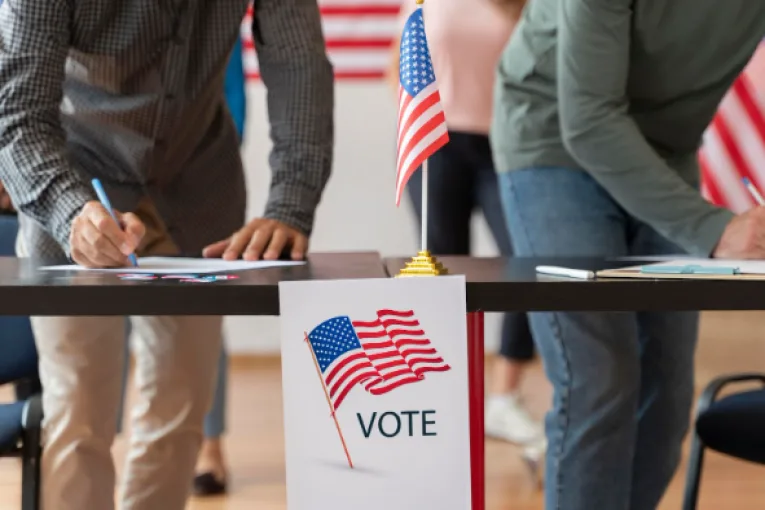
On Nov. 5 2024, Californians rushed to the voting booths to get in their votes for the 2024 general election before the 8 p.m. cutoff. Other than voting for their new president, they also voted on 10 propositions on the ballot that would greatly affect the lives of all California residents — including Proposition 36.
Proposition 36 aims to increase charges and sentences to certain drug and theft crimes in an attempt to stop violent crimes. As of Nov. 5 2024, Proposition 36 became effective as 79.8 percent of Californians voted in favor of Prop 36, while 30.2 percent voted against. Additionally before the election, 16.8 million dollars had been raised in favor of Prop 36, while 7.7 million dollars had been raised against.
Proposition 36 was created to repeal Proposition 47, which was passed ten years ago on Nov. 5, 2014. Proposition 47 hoped to limit the amount of money spent on prisoners by making some offenses considered to be misdemeanors — this included shoplifting, forgery, insufficient funds, petty theft, receiving stolen property, petty theft with a prior, and drug possession offenses. The punishment for these crimes were severely lowered, as shoplifting items worth 950 dollars or less became considered misdemeanors.
Proposition 36 proposed to do three things: firstly, the proposition promised to turn misdemeanors into felonies. Punishment for theft and drugs would be increased as Proposition 47 becomes repealed and shoplifting items under $950 would be considered a felony if the individual has two or more past convictions. It would also lengthen the sentences for some felonies, and could be increased to three years like theft or damage. Some felonies must also serve prison time for selling drugs and the time convicted could be increased due to the amount the individual had sold.
Secondly, the proposition promised to have a treatment-focused punishment for drug possession crimes. Those who are found to be possessing drugs might not receive a sentence to serve prison time, but instead may be subject to a “treatment-mandated felony”. This applies mostly to those who are found to possess drugs or have been convicted in the past for drug crimes. These individuals will receive mental health treatment or drug treatment. If they do not finish the treatment, they could be charged with three years of state prison.
Thirdly, courts must warn those charged with selling drugs that if someone dies due to using their drugs, then they can be charged with murder. This is done to combat homelessness, as drug dependence often leads to people living in the streets.
Although Prop 36 has been passed, those who were against Prop 36 had argued that there is no significant evidence that creating harsher punishments will reduce crime rates. It will also mean that hundreds of millions of dollars in prison costs will be required without actually helping to fix the problem. They argue that Prop 36 will waste $750 million in taxpayers money for actually helpful causes such as mental health and rehabilitation for crime victims to maintain prisons. Other local public safety programs will also lose funding, and it is argued that more of these need to exist if they want to help with safety. Especially since they “have a proven track record of stopping crime”.
The other concern is the re-emergence of the War on Drugs seen in the late 1900s. The War on Drugs was a result of U.S. President Richard Nixon expanding the focus on punishments for drug offenses. This led to 50,000 incarcerations in 1980 to 400,000 incarcerations in 1997. Eventually the U.S. Congress passed the Anti-Drug Abuse Act of 1986 allocating $1.7 billion to the War on Drugs, and having a mandatory prison sentence for those who committed drug offenses. Concerns were raised due to a racial disparity of having an increase in incarceration for African American drug users.
Opposition for Prop 36 came from California Governor Gavin Newson, Speaker Robert Rivas, and Senate President Pro Tem Mike McGuire to name a few. Newson didn’t support Prop 36 — on Sept. 12 2024, Gov. Newson had signed the final bill that completed California’s landmark legislative package aimed to stop retail and property crime. He has spent most of his time in office fighting California crime, giving a 267 million dollars state investment distributed across 55 cities and counties in October 2023, to stop retail crime. These funds would make it easier to hire more police and enforce the new laws, such as stricter penalties for retail and property theft, new penalties for those who damage property and increased penalties for possession of items stolen from cars.
The ballot results of prop 36 shows that voters did not think that his efforts had been enough, eager to turn misdemeanors into felonies. With most of the financial support coming from retail corporations like Walmart, Target and Home Depot are just some of the supporters. This can probably be traced to the crime rate increasing by 28 percent in 2023 than in 2019.